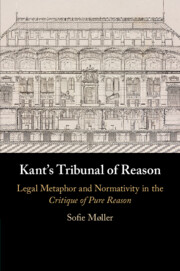Book contents
- Kant’s Tribunal of Reason
- Kant’s Tribunal of Reason
- Copyright page
- Dedication
- Contents
- Acknowledgements
- Abbreviations
- Introduction
- Chapter 1 The Critique of Pure Reason as the Establishment of Reason’s Lawful Condition
- Chapter 2 The Normativity of Law
- Chapter 3 The Transcendental Deduction of the Categories and the Tradition of Legal Deductions
- Chapter 4 The Question of Fact and the Question of Law in Judicial Imputation and in the Transcendental Deduction of the Categories
- Chapter 5 The Tribunal of Reason
- Chapter 6 Moral Conscience as the Practical Inner Tribunal
- Chapter 7 Distinguishing between Rightful Claims and Groundless Pretensions
- Chapter 8 Epistemic Authority as both Individual and Collectively Shared
- Chapter 9 Systematicity and Philosophy as the Legislation of Reason
- Conclusion
- Bibliography
- Index
Chapter 8 - Epistemic Authority as both Individual and Collectively Shared
Published online by Cambridge University Press: 24 February 2020
- Kant’s Tribunal of Reason
- Kant’s Tribunal of Reason
- Copyright page
- Dedication
- Contents
- Acknowledgements
- Abbreviations
- Introduction
- Chapter 1 The Critique of Pure Reason as the Establishment of Reason’s Lawful Condition
- Chapter 2 The Normativity of Law
- Chapter 3 The Transcendental Deduction of the Categories and the Tradition of Legal Deductions
- Chapter 4 The Question of Fact and the Question of Law in Judicial Imputation and in the Transcendental Deduction of the Categories
- Chapter 5 The Tribunal of Reason
- Chapter 6 Moral Conscience as the Practical Inner Tribunal
- Chapter 7 Distinguishing between Rightful Claims and Groundless Pretensions
- Chapter 8 Epistemic Authority as both Individual and Collectively Shared
- Chapter 9 Systematicity and Philosophy as the Legislation of Reason
- Conclusion
- Bibliography
- Index
Summary
This chapter explores the political aspect of the legal metaphors. The main question is how epistemic authority can be both individual and shared. The key metaphors in this chapter are the political community and the distinction between valid laws and arbitrary decrees. To understand this relationship, Møller considers the way we can conceive of the thinking self as a critical authority. On the political nature of pure reason, Onora O’Neill has provided a groundbreaking analysis, which Møller discusses in detail. The thought-provoking accounts of the legal structure of reason by Susan Meld Shell and Friedrich Kaulbach are also considered. Building on this discussion, Møller shows that the lawful nature of reason is a presupposition of its political use in debates and an enlightened community.
Keywords
- Type
- Chapter
- Information
- Kant's Tribunal of ReasonLegal Metaphor and Normativity in the <I>Critique of Pure Reason</I>, pp. 129 - 151Publisher: Cambridge University PressPrint publication year: 2020

